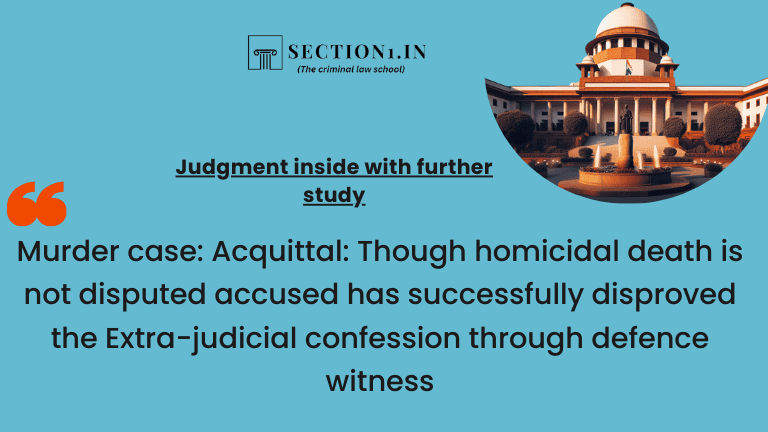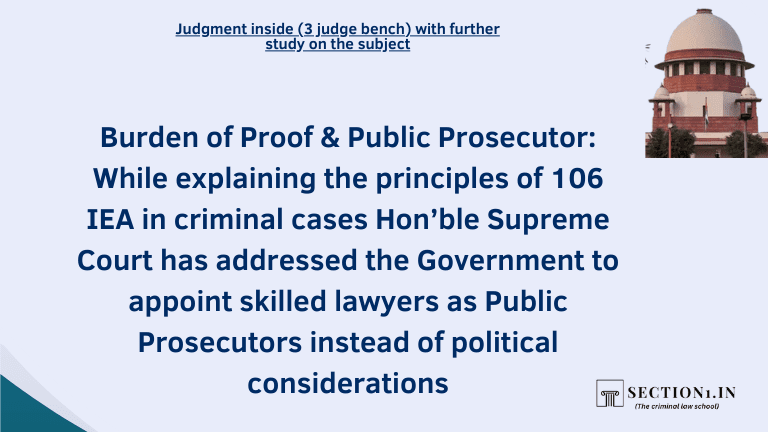This appeal is against an order dated 15th December, 2021 passed by the High Court of Allahabad granting bail to the respondent-accused who was arrested in connection with Crime Case No. 08 of 2019 under Sections 302, 201, 376 read with 120B of the Indian Penal Code and under Sections 5 and 6 of the Protection of Children from Sexual Offences Act (POCSO) for alleged rape and murder of an eleven year old child being the daughter of the appellant.
The offence alleged against the respondent-accused of rape and cold-blooded murder of an eleven year old child is heinous and dastardly. The conduct of killing a child to avoid getting caught of the offence, inter alia, of rape and then burial of the child as also her stained clothes and other articles under the soil to cause disappearance of evidence and evade apprehension for the offence of murder is indicative of a tendency to evade the process of law. It is possible that the respondent-accused might flee to evade the process of law.
The High Court has ignored the materials on record including incriminating statements of witnesses under Section 164/161 of the Code of Criminal Procedure. Statements under Section 161 of Cr.P.C. may not be admissible in evidence, but are relevant in considering the prima facie case against an accused in an application for grant of bail in case of grave offence.
The High Court has granted the respondent-accused bail, without considering the heinous nature of the allegations against him, the gravity of the offence alleged and severity of the punishment in the event of ultimate conviction, only because a co accused had also been granted bail by the High Court.
The impugned order of the High Court incorrectly states that bail is granted considering all facts and circumstances, nature of the allegations, gravity of the offence, severity of the punishment, the evidence appearing against the accused and the law laid down in Dataram Singh vs. State of U.P. & Ors. reported in (2018) 3 SCC 22. This has not been done. The impugned order evinces non-application of mind. In Dataram Singh vs. State of U.P.(supra), this Court held:
“2. There is no doubt that the grant or denial of bail is entirely the discretion of the judge considering a case but even so, the exercise of judicial discretion has been circumscribed by a large number of decisions rendered by this Court and by every High Court in the country. Yet, occasionally there is a necessity to introspect whether denying bail to an accused person is the right thing to do on the facts and in the circumstances of a case”.
The observations and directions in Dataram Singh (supra) were in the context of arrest and long custodial detention in a crime case under Section 138 of the Negotiable Instruments Act, 1881 for issuing cheques and then stopping payment of the cheque. Bail application had been rejected, first by the Trial Court and then by the High Court even after about five months of detention of the accused in custody.
If the High Court had seriously considered the gravity of the offence, there would have been some indication of what was the apparently extenuating circumstance, which entitled the respondent accused to bail. Ex facie, the allegations are grave, the punishment is severe and it cannot be said that there are no materials on record at all.
The appeal is, accordingly, allowed. The impugned order granting bail is set aside. It is however made clear that any observation made in this order will not affect the merits of the trial.
Parties
INDRESH KUMAR vs. THE STATE OF UTTAR PRADESH & ANR. … Respondent(s) – CRIMINAL APPEAL NO. 938 OF 2022 (Arising out of SLP (Crl.) No. 4982 of 2022).
https://main.sci.gov.in/supremecourt/2022/12875/12875_2022_7_32_36306_Order_12-Jul-2022.pdf
Indresh Kumar vs. The State of U.P
Further study
Difference between cancellation of bail and appeal against bail already granted
Bail can be granted despite the presence of the accused, if he is in police custody
No bail or bail cancelled; if witness(es) turned hostile?
Section 167 Cr.P.C and condition
How to cancel bond? Procedure explained
Article: Bail – Class.1 – A basic understanding_Ramprakash Rajagopal






